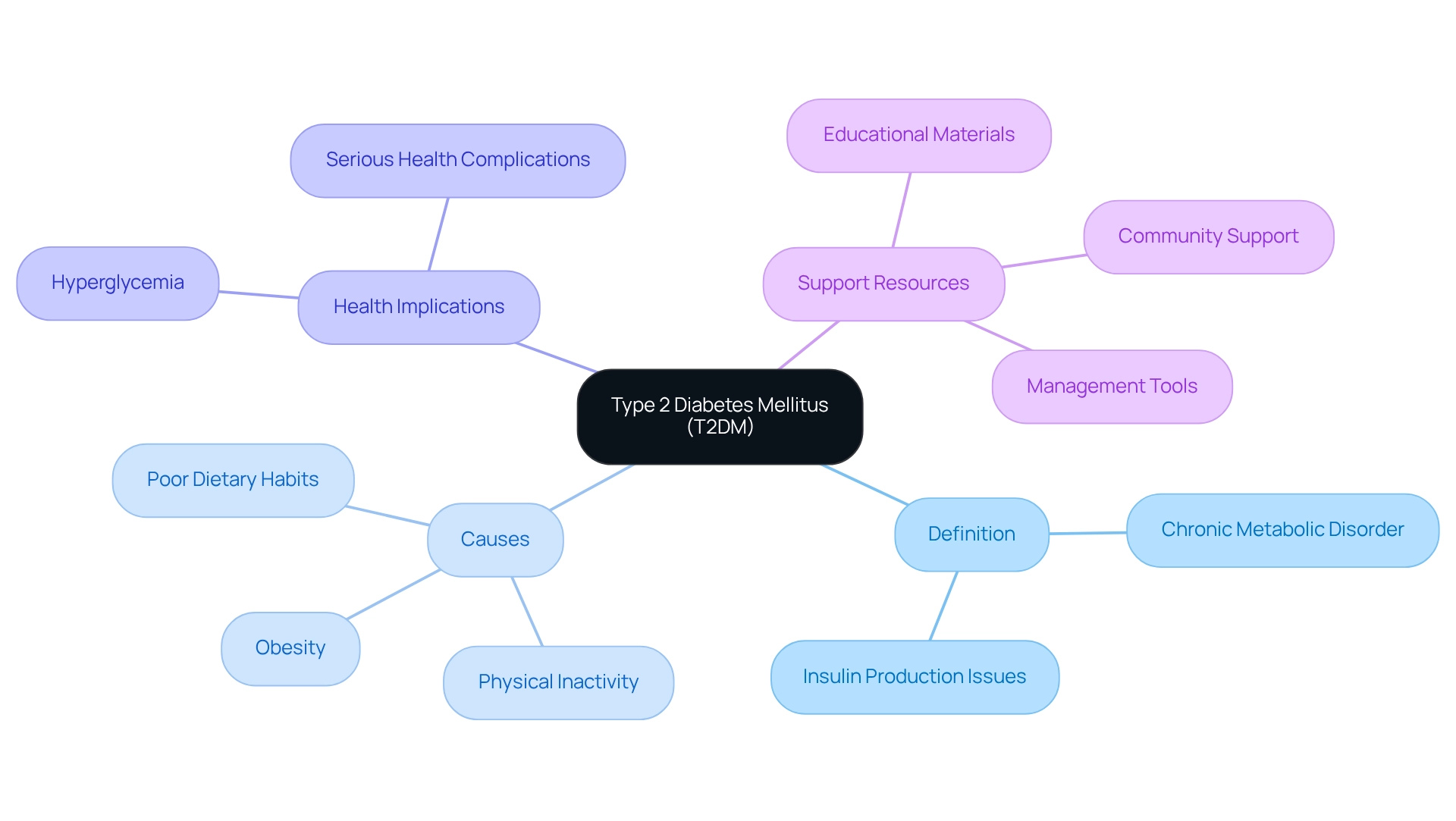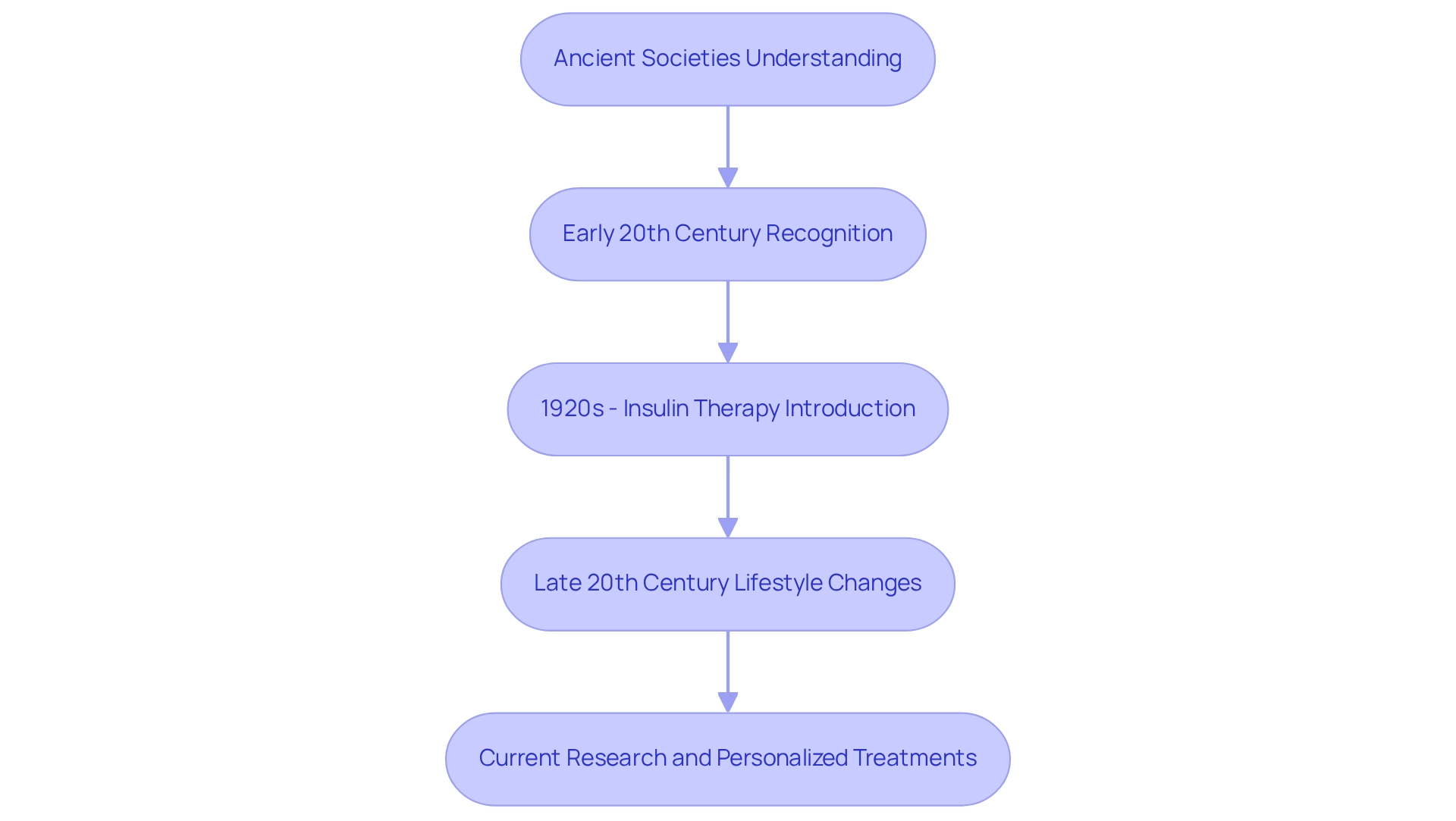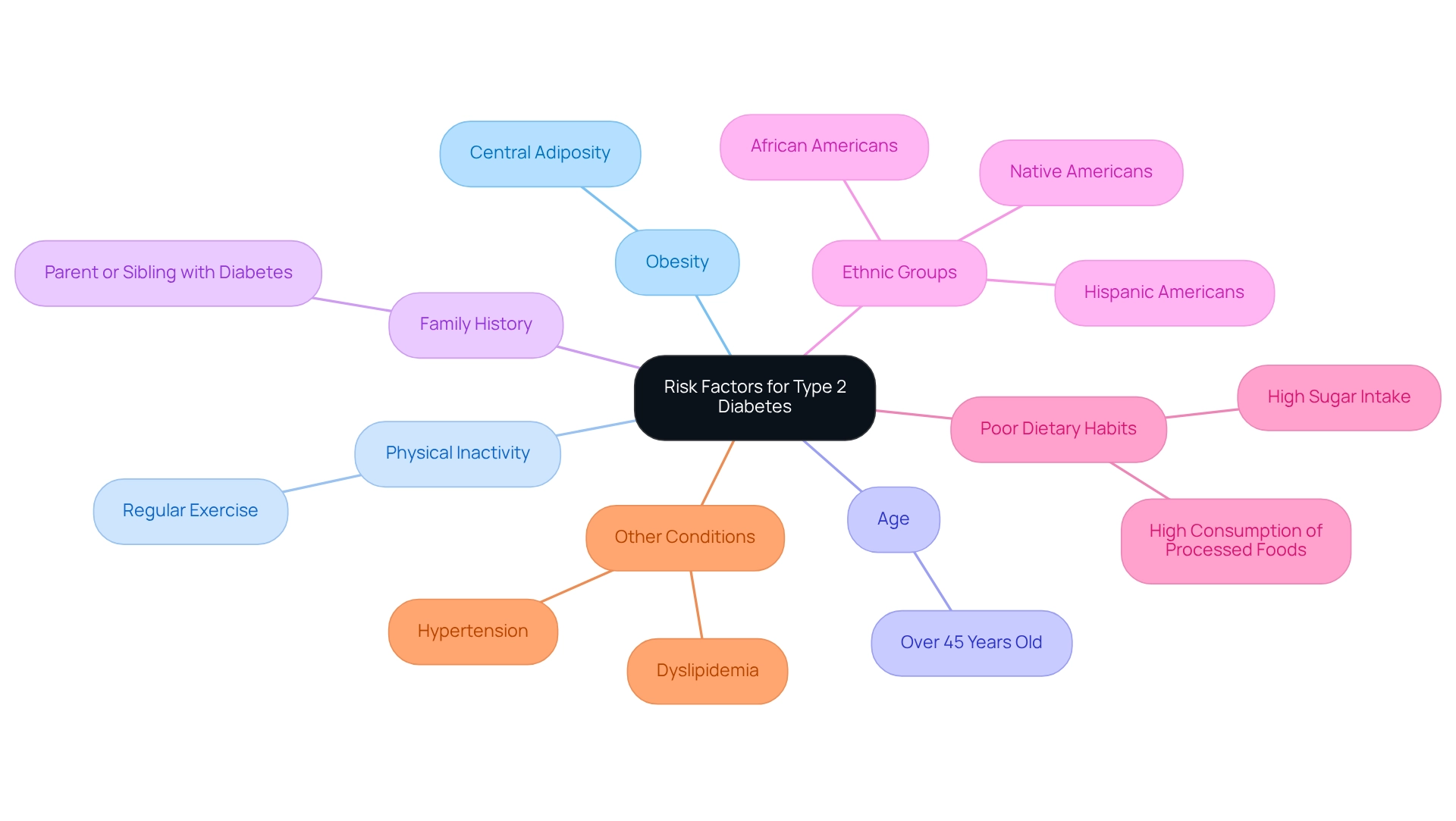Overview
Type 2 Diabetes Mellitus (T2DM) is a chronic metabolic disorder that can feel overwhelming. It is characterized by ongoing hyperglycemia, which occurs when the body either produces insufficient insulin or uses it ineffectively. Often, lifestyle factors such as obesity and physical inactivity play a significant role in this condition. Understanding T2DM's definition and its associated risk factors is essential, as it empowers you to take charge of your health. Remember, you are not alone in this journey; there are support and resources available for those who are newly diagnosed.
It's understandable to feel a mix of emotions upon receiving a diagnosis of T2DM. This condition can raise many questions and concerns, but knowing that help is at hand can make a difference. Seeking out information and support can guide you through managing your health effectively. You deserve to feel confident and informed as you navigate this path. We are here to support you every step of the way.
Introduction
In the landscape of modern health challenges, Type 2 Diabetes Mellitus emerges as a prevalent and complex condition impacting millions around the globe. It's characterized by persistent high blood sugar levels and is often influenced by lifestyle choices. This makes it a significant concern in our current era, where rising obesity rates and sedentary habits are increasingly common. As our understanding of this disease evolves, so does the importance of education and support for those navigating its complexities.
From its historical roots to the many risk factors contributing to its development, exploring Type 2 Diabetes reveals not only the urgency of awareness but also the empowerment that comes from informed management strategies. It's understandable to feel overwhelmed, but remember: you're not alone in this journey. We are here to support you every step of the way. Together, we can foster a community of understanding and proactive management.
Define Type 2 Diabetes Mellitus
Living with Type 2 Diabetes Mellitus (T2DM) can be challenging, and it’s important to understand the type 2 diabetes mellitus definition and what this chronic metabolic disorder means for you. The ongoing hyperglycemia associated with the type 2 diabetes mellitus definition occurs when the body either does not produce enough insulin or cannot effectively use the insulin it does create. This can lead to elevated blood sugar levels, resulting in serious health complications if not managed properly.
Unlike Type 1 Diabetes, which is primarily an autoimmune condition, the type 2 diabetes mellitus definition often associates this condition with lifestyle factors such as obesity, physical inactivity, and poor dietary habits. It’s understandable to feel overwhelmed, especially as the diagnosis of T2DM is increasingly occurring in younger individuals due to rising obesity rates. You are not alone in this journey.
At T2DSolutions, we are here to support you every step of the way. Our platform offers a wealth of resources, including educational materials, community support, and tools tailored to your unique needs. We aim to empower those recently diagnosed with the information necessary for effective management of their condition.
Remember, you don’t have to navigate this path alone. We encourage you to explore the resources available and connect with others who share similar experiences. Together, we can build a community of support and understanding.

Explore the History and Evolution of Type 2 Diabetes
Investigate the Background and Development of the Second Form of Diabetes
The journey of understanding diabetes begins long ago, rooted in ancient societies. The very term 'diabetes' comes from the Greek word meaning 'to pass through,' reflecting the frequent urination associated with this condition. The type 2 diabetes mellitus definition identifies it as a distinct condition first recognized in the early 20th century, primarily affecting adults, which is why it was often referred to as an adult-onset condition. However, as obesity rates have risen globally, particularly among children and adolescents, our understanding of T2DM has evolved significantly.
In the 1920s, the introduction of insulin therapy marked a turning point in diabetes treatment. Yet, it wasn't until the late 20th century that lifestyle changes and oral medications became vital in managing the type 2 diabetes mellitus definition. Today, ongoing research continues to uncover the genetic and environmental factors that contribute to this condition. This knowledge is paving the way for more personalized treatment options.
At T2DSolutions, we understand how important this historical context is for newly diagnosed patients. By exploring the evolution of diabetes management, you can better appreciate the resources and community support available to you today. You're not alone in this journey; we are here to support you every step of the way as you navigate your path toward effective diabetes management. Remember, understanding your condition is a powerful step toward taking control of your health.

Examine Risk Factors and Causes of Type 2 Diabetes
Understanding the risk factors for the type 2 diabetes mellitus definition is crucial for your health journey. Multiple elements contribute to its onset, and it's essential to recognize these so that you can take proactive steps.
- Obesity, particularly central adiposity, is closely linked to insulin resistance.
- Physical inactivity is another significant risk factor; regular exercise can help maintain healthy blood sugar levels.
- Age plays a role as well, with individuals over 45 years old facing a higher risk.
- If you have a family history of diabetes, such as a parent or sibling with the condition, your likelihood of developing it increases.
- Certain ethnic groups, including African Americans, Hispanic Americans, and Native Americans, also experience a higher risk.
Other contributing factors include poor dietary habits, such as high consumption of processed foods and sugars, along with conditions like hypertension and dyslipidemia. It's understandable to feel overwhelmed by this information, but you are not alone in this journey.
At T2DSolutions, we aim to provide educational resources and community support to help newly diagnosed patients navigate these risk factors effectively. Remember, taking the time to understand these elements is a vital step in managing your health, and we are here to support you every step of the way.

Conclusion
Type 2 Diabetes Mellitus is a multifaceted condition that presents significant health challenges, especially in today's world where obesity and sedentary lifestyles are on the rise. Understanding its definition, historical context, and risk factors is crucial for effective management. It's important to recognize that Type 2 Diabetes is not just a result of genetics; lifestyle choices play a significant role as well. This highlights the necessity for education and proactive measures in our daily lives.
The evolution of diabetes management showcases the remarkable progress made in treatment options, ranging from insulin therapy to lifestyle interventions. This history not only provides valuable insight into the resources available today but also empowers patients to take charge of their health. By recognizing the risk factors associated with Type 2 Diabetes, individuals can make informed decisions about their lifestyle and health management, which is a vital step in their journey.
Navigating the complexities of Type 2 Diabetes can feel overwhelming, but support and education are pivotal in this process. With the right knowledge and community backing, you can manage your condition effectively and lead a healthier life. By fostering awareness and encouraging proactive health measures, we can combat the prevalence of Type 2 Diabetes together and improve the quality of life for those affected. Remember, you're not alone in this journey; we are here to support you every step of the way.
Frequently Asked Questions
What is Type 2 Diabetes Mellitus (T2DM)?
Type 2 Diabetes Mellitus is a chronic metabolic disorder characterized by ongoing hyperglycemia, which occurs when the body does not produce enough insulin or cannot effectively use the insulin it produces, leading to elevated blood sugar levels.
What causes Type 2 Diabetes Mellitus?
Type 2 Diabetes Mellitus is often associated with lifestyle factors such as obesity, physical inactivity, and poor dietary habits, unlike Type 1 Diabetes, which is primarily an autoimmune condition.
Who is affected by Type 2 Diabetes Mellitus?
Type 2 Diabetes Mellitus can affect individuals of all ages, but it is increasingly being diagnosed in younger individuals due to rising obesity rates.
How can T2DSolutions help individuals living with T2DM?
T2DSolutions offers a variety of resources, including educational materials, community support, and tools tailored to the unique needs of those recently diagnosed with T2DM, aiming to empower them for effective management of their condition.
Is it possible to find support while managing Type 2 Diabetes Mellitus?
Yes, individuals are encouraged to explore available resources and connect with others who share similar experiences to build a community of support and understanding.



